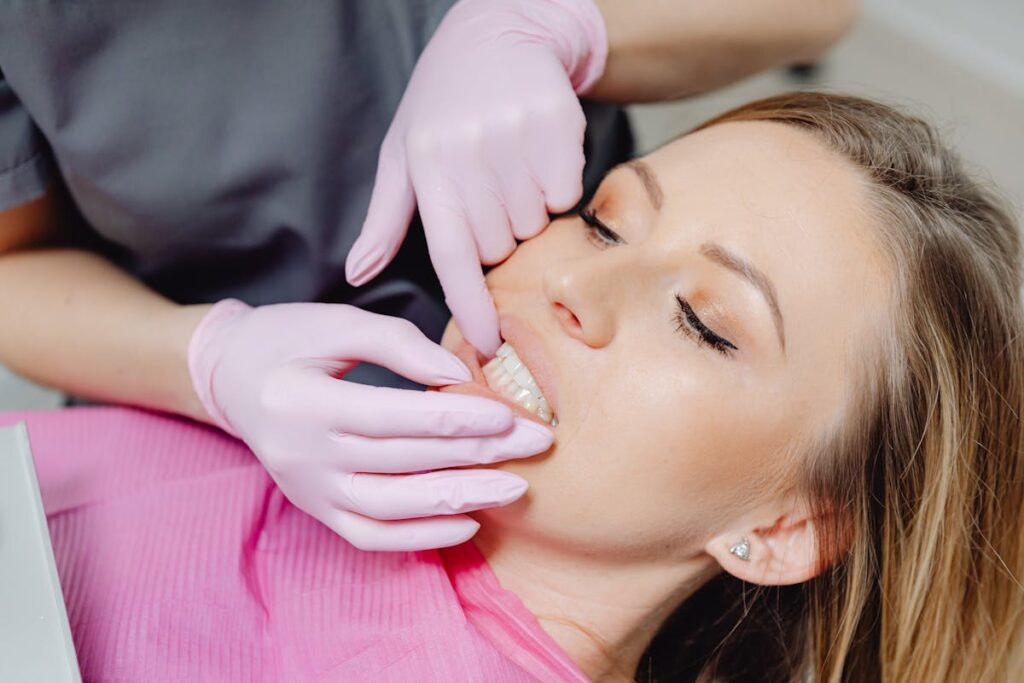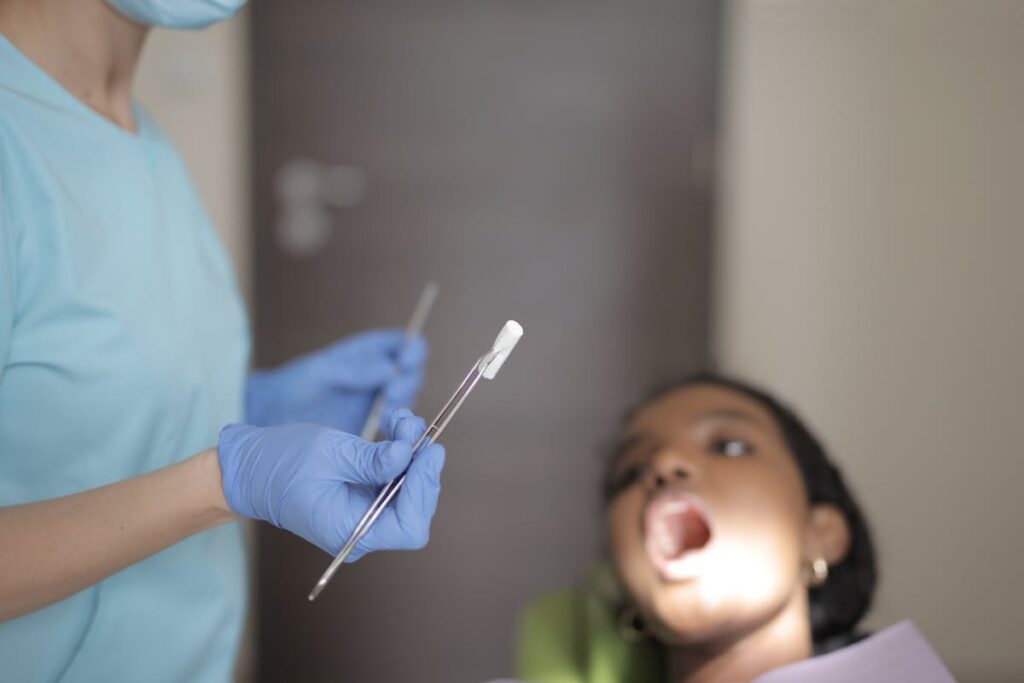Mouth sores may seem like a minor irritation, but if left untreated, they can develop into a major health concern. A persistent or severe mouth sore warrants an immediate visit to an emergency dentist, who is equipped to promptly diagnose and manage such oral health issues. The question then arises: What qualifies as a severe mouth sore, and what can one expect during a visit to an emergency dentist? In addition, how can early intervention prevent potential complications and contribute to overall oral health? Let’s explore this critical topic further.
Understanding Mouth Sores
We’ve all experienced the discomfort of a mouth sore at one point or another. These painful nuisances can appear anywhere within the oral cavity, including the inner cheeks, gums, tongue, lips or palate. It is crucial to understand the different types of mouth sores and their common causes, as this knowledge can guide effective prevention and treatment strategies.
Mouth sores can broadly be classified into two categories: canker sores and cold sores. Canker sores, medically known as aphthous ulcers, are small, shallow lesions that develop on the soft tissues of the mouth. In contrast, cold sores, or fever blisters, are caused by the herpes simplex virus and typically appear on or around the lips.
Common causes of mouth sores vary. Canker sores can be triggered by stress, food sensitivities, hormonal changes, or minor injuries in the mouth. Cold sores, on the other hand, are contagious and can be spread through close personal contact such as kissing or sharing eating utensils, towels, or razors. Understanding these types of mouth sores and their common causes is the first step towards effective management and relief.
Identifying Emergency Symptoms
What should alert you to the necessity of seeking immediate dental attention for a mouth sore? Understanding the causes of mouth sores and the different types of mouth sores is essential, but recognizing emergency symptoms can be a lifesaver.
- Severe Pain: Mouth sores typically cause discomfort, but severe, unbearable pain necessitates an emergency dental visit.
- Persistent Sores: Most mouth sores heal within two weeks. Sores that persist beyond this period could indicate more serious conditions such as oral cancer.
- Accompanying Symptoms: Fever, difficulty swallowing, or swollen lymph nodes alongside a mouth sore are alarming signs.
- Bleeding Sores: If your mouth sore bleeds easily or excessively, it’s an urgent symptom needing immediate dental attention.
Each of these symptoms could signify severe underlying issues, beyond the regular causes of mouth sores and could escalate to dangerous levels if untreated. Identifying these emergency symptoms promptly allows for timely intervention, potentially preventing severe health complications. If you experience any of these symptoms, it’s crucial to seek out emergency dental care for severe mouth sores without delay. Your oral health is paramount, and early intervention can prevent complications that might otherwise escalate quickly.
Importance of Immediate Treatment
The importance of immediate treatment for mouth sores cannot be overstated. Early identification and intervention can greatly reduce the potential risks and complications associated with delayed treatment. In the following section, we will discuss the key symptoms to recognize and the hazards of postponing treatment.
Recognizing Mouth Sore Symptoms
Mouth sores, a common dental ailment, often go unnoticed due to their seemingly benign nature. However, recognizing symptoms early is critical for effective treatment. Various causes of mouth sores, including bacterial or viral infections, injury, or certain medical conditions, can lead to different types of mouth sores with varying symptoms.
- Canker Sores: Small, round sores in your mouth, lips, or on your tongue. They’re often white or yellow in color, surrounded by a red, inflamed area.
- Cold Sores: Also known as fever blisters, these are fluid-filled blisters that usually form near the mouth or on other areas of the face. Unlike canker sores, they are contagious.
- Thrush: A yeast infection in the mouth, causing white patches on the tongue and inside of the cheeks.
- Leukoplakia: These are thick white patches that form on the inside of the cheeks, gums or tongue, often due to tobacco use or other irritants.
Understanding these symptoms and their associated mouth sore types can expedite the diagnostic process, facilitating timely and effective treatment. Never ignore a mouth sore that lingers beyond two weeks. When in doubt, always consult an emergency dentist for professional advice.
Risks of Delayed Treatment
While recognizing the symptoms of mouth sores is the first step towards appropriate care, it is equally significant to understand the risks associated with delaying treatment. Ignoring these symptoms and postponing a visit to the dentist can lead to severe complications, including the long-term effects of continuous pain, difficulty in eating and talking, and a decline in overall oral health.
One of the primary infection risks is the increased chance of bacterial, viral, or fungal invasion, which can exacerbate the condition and lead to systemic complications. Untreated mouth sores can become breeding grounds for harmful microorganisms, causing the infection to spread and potentially leading to conditions such as cellulitis or even a life-threatening disease like sepsis.
Furthermore, chronic mouth sores could also indicate more serious underlying health issues, such as immune disorders or oral cancer. Delaying treatment not only prolongs patient discomfort but also lessens the chance of early detection and effective treatment of these potential diseases. Consequently, immediate consultation with an emergency dentist is vital to prevent the escalation of the problem and guarantee ideal oral health.
Your Visit to the Emergency Dentist
Every so often, an unbearable mouth sore may necessitate an unplanned visit to an emergency dentist. This visit, although unplanned, is essential to prevent further complications. Understanding what to expect during such consultations can make the experience less intimidating.
During your visit, you will generally go through the following steps:
- Initial Assessment: The dentist will conduct an immediate assessment of your oral condition to identify the severity of the mouth sore. This is a vital part of emergency procedures, where immediate attention is required.
- Discussion: The dentist will discuss your symptoms, pain levels, and any relevant medical history. This information is vital for diagnosis and treatment planning.
- Examination: A thorough oral examination will be conducted. The dentist will visually inspect the sore, and may also use tools for a more detailed examination.
- Diagnosis: After the examination, the dentist will provide a diagnosis. The diagnosis will determine the next steps and possible treatment options.

Possible Treatment Methods
Management of mouth sores often involves a combination of medicinal and non-medicinal methods. This section will explore a range of medicinal treatment options available, including prescription medications, over-the-counter products, and topical applications. Additionally, we will outline various non-medicinal relief strategies that can complement the medicinal treatments and enhance overall comfort.
Medicinal Treatment Options
One may often find it advantageous to explore medicinal treatment options when dealing with a mouth sore. These options, prescribed or recommended by an emergency dentist, can provide significant relief and contribute to faster healing.
- Topical analgesics: These are primarily used to relieve pain associated with mouth sores. They contain active ingredients like benzocaine, which numbs the affected area and provides immediate comfort.
- Oral rinses: These are antiseptic solutions that not only cleanse the mouth but also aid in reducing inflammation and discomfort. Some oral rinses also contain anesthetic compounds to numb the pain.
- Oral medication: Certain oral medications, usually antiviral drugs, are prescribed for severe or recurrent mouth sores. These medications are intended to reduce the frequency of outbreaks and speed up the healing process.
- Medicated patches or films: These are placed over the mouth sore and slowly release medication over time. They protect the sore from irritation and promote healing.
Non-Medicinal Relief Methods
Exploring non-medicinal relief methods for mouth sores can offer a holistic approach to managing this common dental issue. While medicinal treatments are often necessary, it is also advantageous to take into account alternative strategies. Among these, home remedies and dietary adjustments stand out as particularly effective.
Home remedies for mouth sores encompass a broad range of practices. These include rinsing with a warm saltwater solution or a mixture of hydrogen peroxide and water, which can help to reduce inflammation and speed up the healing process. Using a soft-bristle toothbrush and avoiding spicy or acidic foods can also minimize irritation and prevent further harm to the affected area.
Dietary adjustments, on the other hand, involve modifying one’s food intake to alleviate discomfort and facilitate recovery. A diet rich in vitamins B and C, iron, and zinc can boost the immune system and promote healing. Hydration is equally essential, as a dry mouth can exacerbate soreness.
These non-medicinal methods should not replace professional dental care but can serve as complementary strategies. Always remember that consulting an emergency dentist is vital when symptoms persist or worsen.
Coping With Mouth Sore Post-Treatment
Steering the post-treatment journey of a mouth sore can often be a challenging experience for patients. Pain management and dietary adjustments become key pillars of the recovery process. Understanding how to effectively cope post-treatment is vital to guaranteeing a smooth and comfortable healing journey.
- Effective Pain Management: Pain is a common post-treatment symptom. Over-the-counter pain relievers can be used under the guidance of your dentist. Remember to avoid aspirin as it can delay the healing process.
- Dietary Adjustments: Soft, cool foods such as yoghurt and ice cream can soothe the sore area. Avoid spicy, hot, or hard foods that can irritate the mouth sore.
- Oral Hygiene: Maintain a regular oral hygiene routine. However, avoid vigorous brushing near the sore area, which can cause further discomfort.
- Rest: Adequate rest is vital for your body to heal. Try to reduce stress and guarantee you’re getting enough sleep.
Prevention and Oral Health Maintenance
Having navigated the path of post-treatment care, it’s pertinent to look ahead at how to maintain oral health and prevent future mouth sores. Prevention is primarily centered around two essential pillars: hygiene practices and dietary considerations.
Hygiene practices are vital in maintaining oral health. Regular brushing and flossing help eliminate bacteria that can cause mouth sores. Using a soft-bristled toothbrush can prevent irritation while a fluoride toothpaste can strengthen the teeth. Regular visits to the dentist for professional cleanings and check-ups are also essential.
Dietary considerations, on the other hand, involve intake of a balanced diet that provides essential nutrients for a healthy mouth. Foods high in vitamins, especially B12 and iron, can help prevent mouth sores. A reduced intake of spicy, salty, or acidic foods and drinks can prevent irritation that could lead to sores. Staying well-hydrated also aids in keeping the mouth moist and less susceptible to sores.
Frequently Asked Questions
What Are the Costs Typically Associated With Emergency Dental Visits for Mouth Sores?
The costs associated with emergency dental visits vary based on treatment options and other cost factors. These may include consultation fees, diagnostic tests, medications, specialized treatments, and follow-up visits, among others. Prices can considerably differ by region and clinic.
Can Stress Cause or Aggravate Mouth Sores?
Yes, stress can indeed cause or exacerbate mouth sores, highlighting the importance of stress management for overall oral health. Stress may weaken the immune system, making the mouth more susceptible to sores and infections.
Is It Safe to Visit an Emergency Dentist During the COVID-19 Pandemic?
Yes, it is safe to visit an emergency dentist during the COVID-19 pandemic. Dental offices have implemented stringent safety protocols and patient precautions to minimize the risk of virus transmission.
Are There Any Home Remedies for Temporary Relief From Mouth Sore Pain?
Yes, there are several home remedies for temporary relief from mouth sore pain. Rinsing the mouth with warm salt water and applying aloe vera gel directly to the sore can greatly alleviate discomfort.
Do Dental Insurance Plans Normally Cover the Treatment for Mouth Sores?
Yes, most dental insurance plans typically cover treatment options for oral health concerns like mouth sores. However, specifics may vary, therefore it’s crucial to review your dental coverage policy for exact details and limitations.
